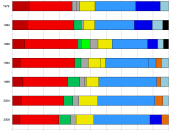Mr. Chalupský, it seems hard to choose an appropriate topic concerning the European Union and of course, it is. Hence the basic question about the Union, now after more than fifty years of an unprecedented success mainly in the field of economic integration, appears to be clear: How is the future of the integration process and what is the final aim of it?
Since the 1950s the European Communities have developed strong economic links between their Member States and with the rest of the world. Progress in the economic field since the 1990s has enabled the Union to attain a level of economic integration unrivalled anywhere else in the world. For example a single market without borders was created and a single currency implemented.
Until the Maastricht Treaty on European Union officially adopted the "three-pillar structure" in 1993, other ways of cooperation were standing behind all that "economic stuff".
But today the economic cooperation forms only the first of the "three pillars" of the Union. There are two other more incorporated in the Treaty: The Common Foreign and Security Policy of the EU (the CFSP) and Cooperation in the fields of justice and home affairs. Let me focus on the second pillar, the CFSP.
Where stands the reason for "neglecting" this obviously important part of every stateôs policy, the Defence and Foreign Affairs policy? Actually, from October 1970 the Member States cooperated and endeavoured to consult each other on major international policy problems. However, this was at intergovernmental level in the context of "European political cooperation". I think, the main reason for this appears to be in the very "nature" of this type of policies.
According to the modern theories of international relations the three basic attributes that every state should posses are geographically restricted area, population and...



Interesting....
An interesting and thought-provoking paper that is of an informative calibre.
A great research item. This paper does a satisfactory job of dissecting various facets of the EU.
Good Job.
2 out of 2 people found this comment useful.